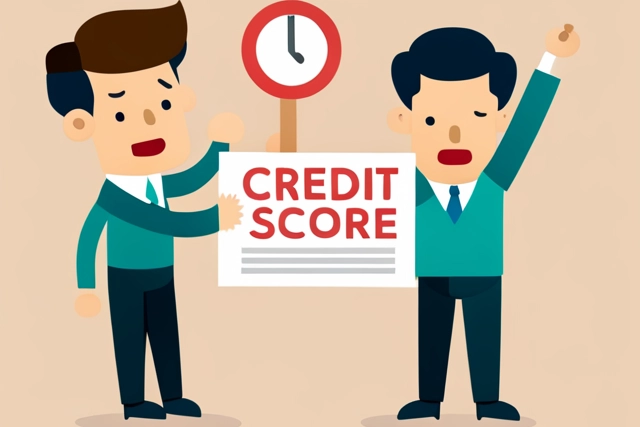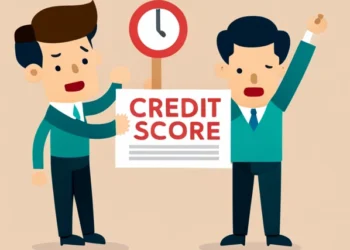01
of 17
I. Introduction
In today’s financial landscape, having a good credit score is crucial for achieving financial stability and unlocking various opportunities. A credit score serves as a numerical representation of an individual’s creditworthiness and plays a significant role in determining their eligibility for loans, credit cards, mortgages, and other financial products. This comprehensive guide aims to provide you with the knowledge and strategies needed to understand, fix, and improve your credit score.
02
of 17
II. Credit Score Basics
What is a Credit Score?
A credit score is a three-digit number that reflects an individual’s creditworthiness based on their credit history and financial behavior. It is a standardized measure used by lenders and financial institutions to assess the level of risk associated with extending credit to an individual.
How is a Credit Score Calculated?
Credit scores are calculated using various algorithms and models developed by credit reporting agencies, with the most common being the FICO Score and Vantage Score. These scores consider factors such as payment history, credit utilization, length of credit history, types of credit, and recent credit inquiries.
Factors Affecting Your Credit Score
Several key factors influence your credit score. These include payment history, credit utilization ratio, length of credit history, credit mix, and new credit inquiries. Understanding these factors is crucial for effectively managing and improving your credit score.
03
of 17
III. Assessing Your Current Credit Score
To embark on your journey of credit score improvement, it’s essential to assess your current credit score and identify areas that need attention.
Obtaining Your Credit Report
Start by obtaining a copy of your credit report from major credit bureaus such as Equifax, Experian, and TransUnion. You can access a free credit report annually from each of these bureaus through annualcreditreport.com.
Analyzing Your Credit Report
Thoroughly review your credit report for any errors, inaccuracies, or fraudulent activities. Look for incorrect personal information, late payments, accounts in collections, and any other discrepancies that may be negatively impacting your credit score.
Identifying Areas for Improvement
Based on the analysis of your credit report, identify specific areas where you can make improvements. This could include addressing late payments, reducing credit card balances, and resolving any outstanding debts or disputes.
04
of 17
IV. Fixing Errors on Your Credit Report
It’s not uncommon for credit reports to contain errors or inaccuracies that can harm your credit score. It’s essential to rectify these errors promptly.
Recognizing Common Errors on Credit Reports
Common errors on credit reports include incorrect personal information, accounts mistakenly reported as delinquent, duplicate accounts, and outdated negative information. Identifying these errors is the first step toward resolving them.
Disputing Inaccurate Information
If you spot inaccuracies on your credit report, you have the right to dispute them. Contact the credit reporting agency in writing, providing clear explanations and supporting documentation to substantiate your claims. The agency is required to investigate and correct any errors within a specific timeframe.
Monitoring the Progress of Credit Report Corrections
Keep a record of your dispute letters and maintain regular communication with the credit reporting agencies to monitor the progress of your credit report corrections. Check your updated credit report to ensure the errors have been rectified.
05
of 17
V. Building a Solid Credit History
Building a strong credit history is essential for achieving a good credit score and financial stability.
Establishing Credit if You Have None
If you have no credit history, start by opening a secured credit card or becoming an authorized user on someone else’s credit card. This allows you to establish a credit history and demonstrate responsible credit behavior.
Responsible Credit Card Usage
Using credit cards responsibly is crucial for maintaining a good credit score. Make timely payments, keep your credit utilization ratio low, and avoid maxing out your credit cards. Pay off the balance in full whenever possible to avoid high-interest charges.
Diversifying Your Credit Mix
Having a diverse credit mix, such as a combination of credit cards, loans, and mortgages, can positively impact your credit score. However, only take on credit that you can comfortably manage and make payments on time.
06
of 17
VI. Managing Credit Card Debt
Credit card debt can be a significant obstacle to achieving a good credit score. Effectively managing and paying off your credit card debt is crucial.
Creating a Repayment Plan
Create a repayment plan by assessing your current financial situation and setting a realistic budget. Prioritize paying off high-interest credit card debt first while making minimum payments on other cards.
Strategies for Paying Off Credit Card Debt
Consider utilizing strategies like the debt snowball method or the debt avalanche method to pay off your credit card debt systematically. These methods involve focusing on one debt at a time while making minimum payments on others.
Avoiding Credit Card Pitfalls
To avoid falling back into credit card debt, practice responsible spending habits. Avoid impulse purchases, prioritize needs over wants, and consider using cash or debit cards instead of relying solely on credit cards.
07
of 17
VII. Dealing with Delinquent Accounts
Delinquent accounts, such as overdue payments and collections, can significantly impact your credit score. It’s crucial to address these accounts promptly.
Understanding Delinquent Accounts
Delinquent accounts are accounts on which you have missed payments or failed to meet your financial obligations. They can lead to negative marks on your credit report, resulting in a lower credit score.
Negotiating with Creditors
If you’re struggling to make payments on delinquent accounts, reach out to your creditors and explore options for negotiation. They may be willing to work out a repayment plan or offer alternative arrangements to help you get back on track.
Setting Up a Debt Repayment Plan
Develop a debt repayment plan to address delinquent accounts systematically. Prioritize paying off accounts with the highest interest rates or those in collections first while making minimum payments on other accounts.
08
of 17
VIII. Managing Outstanding Loans
Outstanding loans, such as student loans, mortgages, or personal loans, can impact your credit score and overall financial health. Proper management is crucial.
Effective Strategies for Student Loan Repayment
If you have student loans, explore repayment options such as income-driven repayment plans or refinancing. Make timely payments and consider paying more than the minimum amount to pay off the loans faster.
Handling Mortgage or Auto Loan Issues
If you’re facing challenges with your mortgage or auto loan payments, contact your lender immediately. They may offer assistance programs or loan modifications to help you avoid defaulting on your payments.
Options for Dealing with Personal Loans
If you’re struggling with personal loans, consider negotiating with the lender for a modified repayment plan or exploring debt consolidation options. Prioritize paying off high-interest personal loans first.
09
of 17
IX. Improving Payment History
Maintaining a positive payment history is vital for a good credit score. Timely payments and responsible financial habits are key.
Making Timely Payments
Consistently make payments on time for all your credit obligations, including credit cards, loans, and other bills. Late payments can have a significant negative impact on your credit score.
Setting Up Payment Reminders
Set up payment reminders, either through your bank or with the help of mobile apps or online tools, to ensure you never miss a payment deadline. Automated reminders can help you stay organized and avoid late payments.
Recovering from Late Payments
If you’ve had late payments in the past, focus on making timely payments moving forward. Over time, your positive payment history will outweigh the impact of previous late payments.
10
of 17
X. Controlling Credit Utilization
Credit utilization, which refers to the amount of credit you’re using compared to your total available credit, plays a crucial role in your credit score.
Understanding Credit Utilization Ratio
Credit utilization ratio is calculated by dividing your credit card balances by your total credit limit. It’s recommended to keep your credit utilization below 30% to maintain a good credit score.
Techniques for Reducing Credit Utilization
To reduce credit utilization, focus on paying down your credit card balances. Make larger payments whenever possible, and consider spreading your expenses across multiple credit cards to keep individual utilization ratios low.
Increasing Your Available Credit
Increasing your available credit can positively impact your credit utilization ratio. You can request credit limit increases on existing credit cards or consider opening new credit accounts strategically. However, use caution and avoid taking on excessive credit.
11
of 17
XI. Building a Strong Financial Foundation
Building a strong financial foundation goes beyond credit scores. It involves developing healthy financial habits and planning for the future.
Creating a Budget and Sticking to It
Develop a budget that outlines your income, expenses, and savings goals. Stick to your budget by tracking your spending, reducing unnecessary expenses, and prioritizing savings.
Establishing an Emergency Fund
Set aside funds in an emergency savings account to cover unexpected expenses. Aim to save three to six months’ worth of living expenses to provide a financial safety net.
Saving for the Future
Apart from emergency savings, prioritize long-term savings goals such as retirement planning and investments. Consult with a financial advisor to determine the best strategies based on your financial situation and goals.
12
of 17
XII. Using Secured Credit Cards to Rebuild Credit
Secured credit cards can be valuable tools for rebuilding credit for individuals with poor or limited credit history.
Understanding Secured Credit Cards
Secured credit cards require a security deposit, which becomes the credit line for the account. They are designed for individuals who may not qualify for traditional credit cards due to their credit history.
Finding the Right Secured Credit Card
When choosing a secured credit card, look for cards with low fees and reporting to all major credit bureaus. Compare interest rates and terms to find the best option for your needs.
Utilizing Secured Credit Cards Effectively
To use a secured credit card effectively, make small purchases and pay off the balance in full and on time each month. This demonstrates responsible credit behavior and helps rebuild your credit over time.
13
of 17
XIII. Seeking Professional Credit Counseling
In some cases, seeking professional credit counseling can provide valuable guidance and support for improving your credit score.
When to Consider Credit Counseling
Consider credit counseling if you’re overwhelmed with debt, struggling to manage your finances, or unsure about the best strategies for improving your credit score. Credit counselors can provide personalized advice and help you create a plan.
Choosing a Reputable Credit Counseling Agency
Research and choose a reputable credit counseling agency. Look for non-profit organizations that offer certified counselors and have a track record of helping individuals with credit-related issues.
Working with a Credit Counselor
When working with a credit counselor, be open and honest about your financial situation. Provide all necessary information and follow their recommendations to maximize the benefits of credit counseling.
14
of 17
XIV. Addressing Public Records and Bankruptcy
Public records such as bankruptcy, tax liens, and judgments can have severe consequences for your credit score. It’s crucial to understand how to address these situations.
Dealing with Bankruptcy
Bankruptcy has a significant negative impact on your credit score and financial standing. Consult with a bankruptcy attorney to understand the implications and navigate the process effectively.
Resolving Tax Liens and Judgments
Address tax liens and judgments promptly by working with the appropriate government agencies or creditors. Develop a plan to satisfy the outstanding debts and follow through on your commitments.
Rebuilding Credit After Public Records
Rebuilding credit after public records can be challenging but not impossible. Focus on positive financial habits, such as making timely payments, reducing debt, and demonstrating responsible credit behavior over time.
15
of 17
XV. Avoiding Credit Repair Scams
Recognizing Red Flags: To protect yourself from credit repair scams, watch out for the following warning signs:
- Guaranteed results: No legitimate credit repair company can guarantee specific outcomes or remove accurate negative information from your credit reports.
- Upfront payment requests: Be cautious if a company asks for payment before providing any services. Legitimate credit repair companies typically charge after they have performed the promised services.
- Lack of written agreements: A reputable credit repair company will provide a written contract that outlines the services to be provided, the cost, and the timeframe for achieving results.
Tips for Avoiding Scams: Follow these tips to avoid falling victim to credit repair scams:
- Research the company: Before engaging any credit repair service, research its reputation. Check for reviews, look for complaints with consumer protection agencies, and verify its credentials.
- Understand your rights: Familiarize yourself with the Fair Credit Reporting Act (FCRA) and the Credit Repair Organizations Act (CROA) to know your rights when dealing with credit repair services.
- DIY credit repair: Consider taking the DIY approach to credit repair. You can dispute inaccuracies on your credit reports yourself or work with nonprofit credit counseling agencies that offer legitimate assistance.
Resources for Legitimate Credit Help: If you need legitimate credit help, consider the following resources:
- Nonprofit credit counseling agencies: These organizations offer free or low-cost credit counseling services and can provide guidance on managing your debts and improving your credit.
- Consumer Financial Protection Bureau (CFPB): The CFPB offers resources and educational materials on credit repair, debt management, and credit reporting. Their website provides helpful information.
- AnnualCreditReport.com: This website allows you to access a free copy of your credit report from each of the three major credit bureaus once every 12 months. Reviewing your reports regularly is essential for monitoring your credit.






